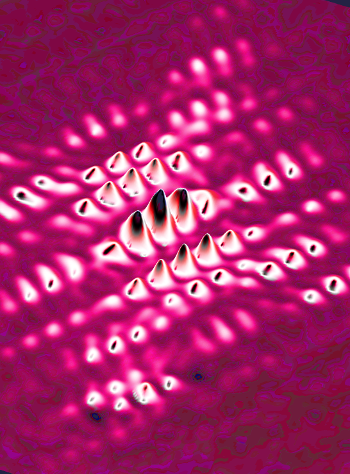Dark energy sensor lights up
 Australians have helped gather the first insights from an Australian instrument that measures dark energy.
Australians have helped gather the first insights from an Australian instrument that measures dark energy.
Understanding the mysterious force behind the expanding universe is a step closer with the first tranche of data released from the Dark Energy Spectroscopic Instrument (DESI).
University of Queensland astrophysicist Dr Rossana Ruggeri is part of the team using DESI, the most powerful apparatus for photographing light ranges in the world.
“The instrument is able to measure light from more than 100,000 galaxies in one night,” Dr Ruggeri said.
“It uses 5,000 robotic positioners to move optical fibres that capture light from objects millions or billions of light-years away.
“That light tells researchers how far away an object is, helping them to build a three-dimensional cosmic map.
“As the universe expands, it stretches light’s wavelength, making the light appear redder – a phenomenon known as redshift – and the further away the galaxy, the bigger the redshift.
“DESI specialises in collecting redshifts that can then be used to solve some of astrophysics’ biggest puzzles: what dark energy is and how it has changed throughout the universe’s history.”
The Lawrence Berkeley National Laboratory operates the instrument, which is located in Kitt Peak, Arizona.
More than 3,500 exposures were taken over six months during the experiment’s survey validation phase, creating 80 terabytes of initial data.
Dr Ruggeri and UQ colleagues including Dr Cullan Howlett, Dr Khaled Said and Professor Tamara Davis, play leading roles ensuring data quality, studying how gravity bends the path of light, and observing how galaxies move and cluster.
The UQ team said that DESI had already made two interesting discoveries – evidence of a mass migration of stars into the Andromeda galaxy, and incredibly distant quasars, which are the extremely bright and active supermassive black holes sometimes found at the centre of galaxies.
UQ’s Professor Tamara Davis said that the initial discoveries were thrilling, but there was more to discover.
“DESI is currently two years into its five-year run and ahead of schedule on its quest to collect more than 40 million redshifts,” Professor Davis said.
“The survey has already catalogued more than 15 million galaxies in its science run and is adding more than a million per month.
“There’s plenty of data yet to come from the experiment, and it’s fantastic that UQ can be part of answering some of the most fundamental questions about our universe.”
More details are accessible here.








 Print
Print